Retro Replay Review
Gameplay
The Great Machine employs a classic Choose-Your-Own-Adventure framework, trading fast-paced action for a contemplative, text-driven experience. Players navigate a series of decisions—each choice a small gear in the vast engine of conflict—guiding a lowly soldier through harrowing battlefields and morally fraught operations. Rather than thrusting you into explosive firefights, the game challenges your conscience: do you follow orders to assassinate “Los,” or do you question the machinery of war itself?
(HEY YOU!! We hope you enjoy! We try not to run ads. So basically, this is a very expensive hobby running this site. Please consider joining us for updates, forums, and more. Network w/ us to make some cash or friends while retro gaming, and you can win some free retro games for posting. Okay, carry on 👍)
Interactivity is deliberately limited, reinforcing the sense of powerlessness at the heart of the narrative. Options often feel equally bleak, emphasizing the futility of individual agency in a cycle of violence that spans millennia. Yet each selection unlocks new passages of moody prose or occasional free-verse interludes that dramatize physical wounds and psychological scars. Though simple in structure, the branching narrative offers multiple endings, encouraging replay to glean fresh insights into the machine’s relentless logic.
While combat is never simulated with stats or flashy mechanics, the tension is omnipresent. You’re never far from the crack of rifle fire or the stench of blood-soaked earth, conveyed through evocative descriptions rather than polygons and particle effects. Decisions carry weight, and the sparse feedback—often limited to narrative shifts—mirrors the protagonist’s own uncertainty. This minimalist approach to gameplay places the burden of meaning squarely on the player’s shoulders, much as it does the young idealists sacrificed within the machine.
Graphics
True to its allegorical design, The Great Machine forgoes elaborate visuals in favor of stark, text-only presentation. The user interface resembles an old leather-bound journal, with a monochrome color palette that casts every page in shades of gray. There are no character portraits or battlefield backdrops—only the words themselves, arranged with deliberate spacing to evoke the weight of each sentence.
Occasional typographical flourishes—such as lines broken into jagged free-verse—serve as the game’s closest approximation of “graphic” impact. These poetic interludes bleed across the black background, the white text reminiscent of chalk scrawled on stone. In lieu of cutscenes, you’re presented with bare-bones screens where font size, line breaks, and occasional italic emphasis become the visual language conveying shock, fear, or despair.
This stripped-down aesthetic grants the prose full attention, ensuring that each metaphorical tooth in the machine’s gears spins vivid scenes in your imagination. For players accustomed to cinematic explosions and detailed character models, The Great Machine’s visuals may feel skeletal—but that skeletal design is precisely the point: war boils down to words, orders, and the blood they demand.
Story
The narrative of The Great Machine is an unflinching allegory of cyclical human folly. Written by Jonas Kyratzes, the plot spans the tortured service of a nameless soldier drafted into endless war. You are compelled by unseen authorities to eliminate “Los,” a charismatic leader whose pacifist cult threatens the efficiency of your own military unit. The premise places you at the crossroads between unquestioning obedience and quiet dissent.
From the trenches to abandoned villages, every locale pulses with haunting imagery: the “cruel teeth” of gears oiled with young idealists’ blood, furnaces fed by defiled bodies. Kyratzes intersperses straightforward narrative with nightmarish hallucinations—some supernatural, some the product of shell shock—blurring the line between reality and psychological breakdown. The result is a morality play in text form, where every sentence underscores the machine’s merciless self-perpetuation.
Despite its bleakness, the story offers fleeting moments of fragile hope. A whispered plea from a child, a memory of home, or a shared glance with a fellow soldier can spark doubt about your orders. Yet those sparks are quickly smothered by the machine’s grinding gears, reinforcing the futility at the heart of the tale. Echoes of Orwell’s “boot stamping on a human face forever” reverberate through the prose, reminding players that this is not a heroic quest, but an indictment of human authority wielded without conscience.
Overall Experience
The Great Machine is not for the faint of heart. It delivers a slow-burning, introspective journey through a world where war is both economic engine and moral abyss. Gameplay may feel sparse to those expecting action conventions, but the weight of each choice and the elegance of the prose more than compensate for the lack of pixel-perfect graphics or twitch-based mechanics.
This is a game to savor rather than speedrun. Sessions can stretch into hours as you pore over each paragraph, wrestling with ethical dilemmas and absorbing the relentless commentary on institutional violence. Replayability comes from exploring alternative branches and piecing together the full scope of the machine’s machinations—though complete solace remains forever out of reach.
For players seeking a thought-provoking, literature-driven experience that shines an unforgiving light on the machinery of conflict, The Great Machine is an unforgettable proposition. It challenges you not to save the world, but to question why the world must be saved at such a terrible cost—and whether anyone truly has the power to change the gears already set in motion.
 Retro Replay Retro Replay gaming reviews, news, emulation, geek stuff and more!
Retro Replay Retro Replay gaming reviews, news, emulation, geek stuff and more!
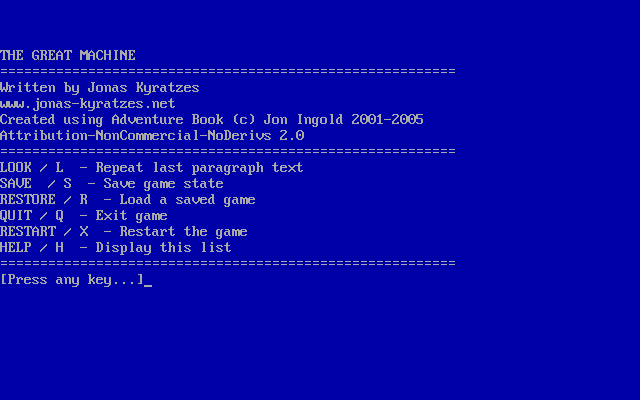
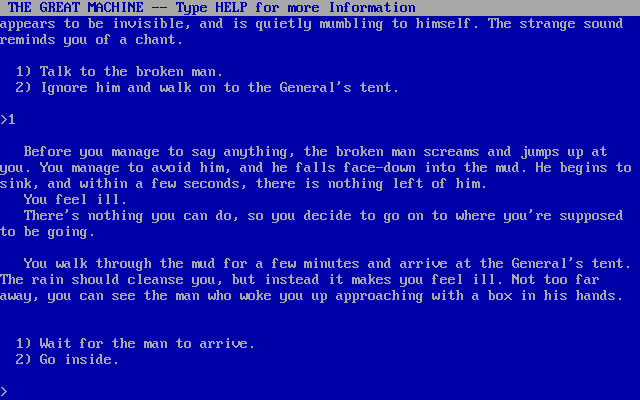
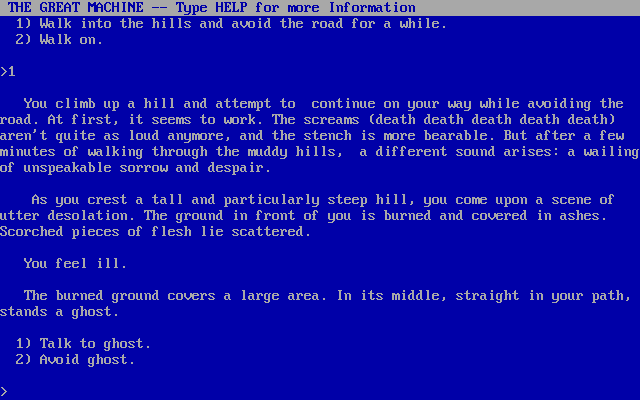
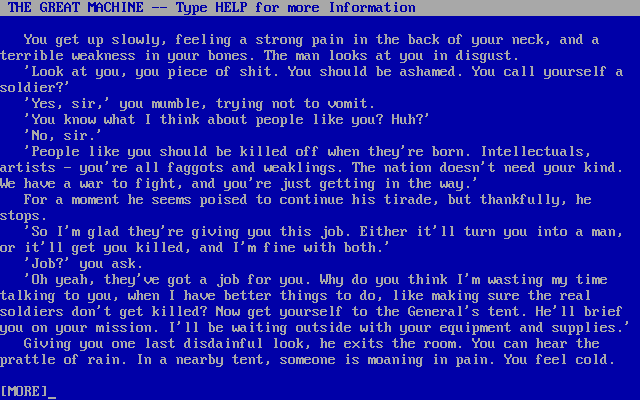
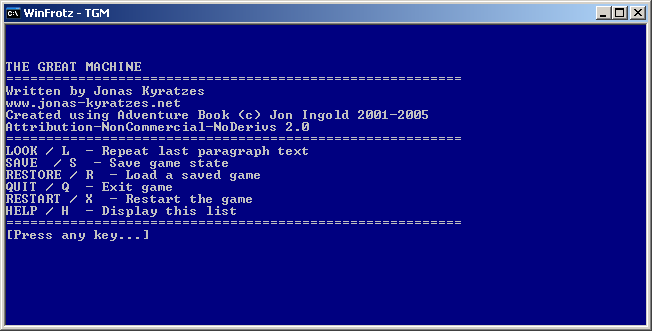
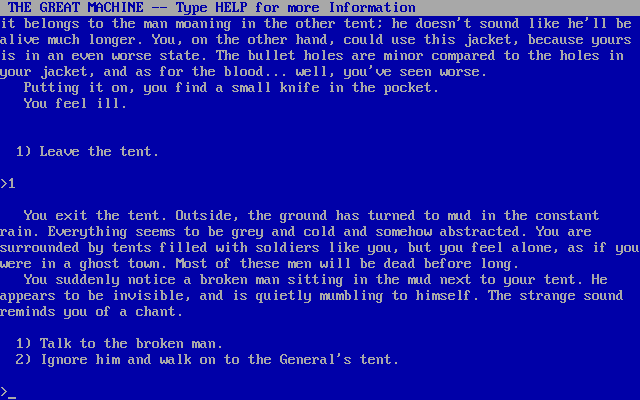
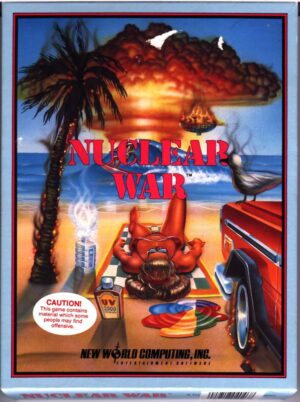
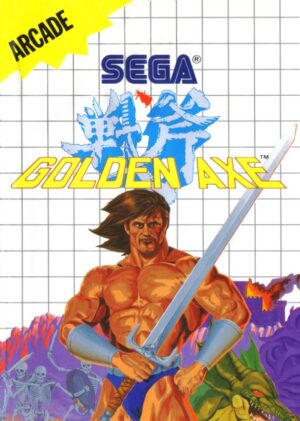

Reviews
There are no reviews yet.